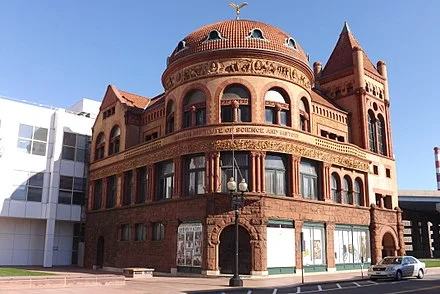Chris Powell: Giving more money to badly governed cities is a waste
The P.T. Barnum Museum, in Bridgeport, named after the 19th Century circus mogul, who lived in that city.
In recent weeks seven Connecticut news organizations have gotten together in what they have called the Cities Project, examining ways of reviving the state's struggling cities. Much of the reporting has been about raising revenue -- extracting more financial aid from state government; applying property taxes to colleges, hospitals and other nonprofits; allowing cities to impose a sales tax on restaurant meals; and so forth.
It's tedious. For giving cities a lot more money has been state government policy for more than 40 years, ever since the state Supreme Court's decision in the school financing case of Horton v. Meskill, in 1977.
State government now covers half of city government budgets. Last year this policy exploded into extravagant incoherence when the General Assembly more or less accidentally authorized state government to assume more than $500 million in Hartford's long-term bonded debt. This rewarded and reimbursed the city for spending $80 million, despite its insolvency, to build a baseball stadium with which it stole the minor-league team of another struggling city, New Britain.
Better journalism might explore why so little about urban policy in Connecticut has worked since the cities began declining in the 1960s. Despite spending ever more money from both their own tax bases and the state's, the cities are poorer and more dysfunctional, incompetent and corrupt than ever, and their demographics are so desperate that they are hardly capable of self-government, lacking enough of a politically engaged and independent middle class to fend off the government and welfare classes, whose own furious political engagement guarantees their incomes.
Better journalism might ask why welfare policy in Connecticut produces only generational dependence and social disintegration, not self-sufficiency. It might ask why Connecticut's education policy in the cities accomplishes mainly social promotion and ignorance. It might ask why government gives priority to the compensation of its own employees. It might ask why the middle class escaping from the cities and the middle class already living in the suburbs should want this chronic failure extended to them through regionalism.
Policy premises here need to be challenged by journalism, not coddled. For why should anyone think that another 40 years of throwing money at what has failed to restore the cities will work someday? And how do the big thinkers who have presided over this disaster get away with considering themselves enlightened instead of culpable?
The tragedy of Connecticut's cities is metaphorically conveyed by a 15-minute video made last September and highlighted the other day by Only in Bridgeport blogger Lennie Grimaldi. The video, made to promote a now-stalled redevelopment proposal for the city's downtown, shows the Greater Bridgeport Symphony Orchestra playing British composer Vaughn Williams' ethereal "The Lark Ascending" in the decrepit former Palace Theater.
The orchestra's performance is magnificent and the video gently contrasts it with the theater's moldy walls and crumbling ceilings, thereby hinting at the Bridgeport that once was and might be again. Amid the frequent shootings in the city, it is hard to imagine, but there it is: a tremendous symphony orchestra with Bridgeport in its name. Within living memory Bridgeport was the industrial capital of Connecticut, but today the factories are empty hulks like the theater.
Great talent and potential remain here but there is only an echo of civic virtue. Weep for it now that government in Connecticut makes sure to succeed only with its own salaries and pensions.
Chris Powell is a columnist for the Journal Inquirer in Manchester, Conn.
